Fed Will Cut Rates This Year, According to Bloomberg Analyst
15.07.2024 8:30 2 min. read Alexander Stefanov
Bloomberg analyst Mike McGlone anticipates significant developments at the Federal Reserve, foreseeing potential interest rate cuts in response to recent shifts in US equities.
This marks a pivotal moment as the central bank navigates a changing economic landscape characterized by easing inflationary pressures and softening labor market conditions.
McGlone draws comparisons to historical rate hike cycles, highlighting precedents where rate reductions followed extended periods of tightening policy, potentially mirroring the current trajectory.
Yeah, the Fed’s gonna cut rates. From 2004-06, the #FederalReserve hiked 425 bps and the surprise index floor came in December 2006. September 2007 marked the first rate cut. July 2023 was the last of 525 bps of rate hikes that started in 1Q22. Sticky #inflation may delay Fed… pic.twitter.com/sYl6xnD214
— Mike McGlone (@mikemcglone11) July 13, 2024
Federal Reserve Chair Jay Powell and other officials signal readiness to adjust monetary policy, citing improved control over inflation and a cautious approach to sustaining economic growth. Recent economic data supports the case for easing, with indicators pointing towards manageable inflation levels and moderate job market adjustments.
This backdrop sets expectations for the Fed to announce a 25 basis point rate cut in September, with potential for additional measures depending on economic indicators and global financial developments.
Market sentiment reflects growing confidence in the Fed’s ability to steer a balanced course, with traders pricing in anticipated rate cuts to stimulate economic activity and bolster market stability.
The Fed’s strategy aims for a “soft landing,” aiming to curb inflationary pressures without jeopardizing employment gains, aligning with global efforts among central banks to foster sustainable economic recovery in the post-pandemic era.
-
1
Robert Kiyosaki Predicts 2025 “Super-Crash,” Urges Hoarding Gold, Silver, and Bitcoin
23.06.2025 13:31 2 min. read -
2
Billionaire Slams Meme Stock Hype and Sounds Alarm on U.S. Fiscal Health
15.06.2025 18:00 2 min. read -
3
Nassim Taleb Says Global Trust Is Shifting from the Dollar to Gold
22.06.2025 17:00 1 min. read -
4
Billionaire Investor Sees Dollar Crash If Key Support Breaks
18.06.2025 15:00 1 min. read -
5
Geopolitical Shockwaves Hit Ethereum Hard While Bitcoin Stays Resilient
22.06.2025 16:21 1 min. read
Robert Kiyosaki Predicts When The Price of Silver Will Explode
Robert Kiyosaki, author of Rich Dad Poor Dad, has issued a bold prediction on silver, calling it the “best asymmetric buy” currently available.
U.S. PCE Inflation Rises for First Time Since February, Fed Rate Cut Likely Delayed
Fresh data on Personal Consumption Expenditures (PCE) — the Federal Reserve’s preferred inflation gauge — shows inflation ticked higher in May, potentially delaying the long-awaited Fed rate cut into September or later.
Trump Targets Powell as Fed Holds Rates: Who Could Replace Him?
Federal Reserve Chair Jerome Powell is once again under fire, this time facing renewed criticism from Donald Trump over the Fed’s decision to hold interest rates steady in June.
U.S. National Debt Surge Could Trigger a Major Crisis, Says Ray Dalio
Billionaire investor Ray Dalio has sounded the alarm over America’s soaring national debt, warning of a looming economic crisis if no action is taken.
-
1
Robert Kiyosaki Predicts 2025 “Super-Crash,” Urges Hoarding Gold, Silver, and Bitcoin
23.06.2025 13:31 2 min. read -
2
Billionaire Slams Meme Stock Hype and Sounds Alarm on U.S. Fiscal Health
15.06.2025 18:00 2 min. read -
3
Nassim Taleb Says Global Trust Is Shifting from the Dollar to Gold
22.06.2025 17:00 1 min. read -
4
Billionaire Investor Sees Dollar Crash If Key Support Breaks
18.06.2025 15:00 1 min. read -
5
Geopolitical Shockwaves Hit Ethereum Hard While Bitcoin Stays Resilient
22.06.2025 16:21 1 min. read


